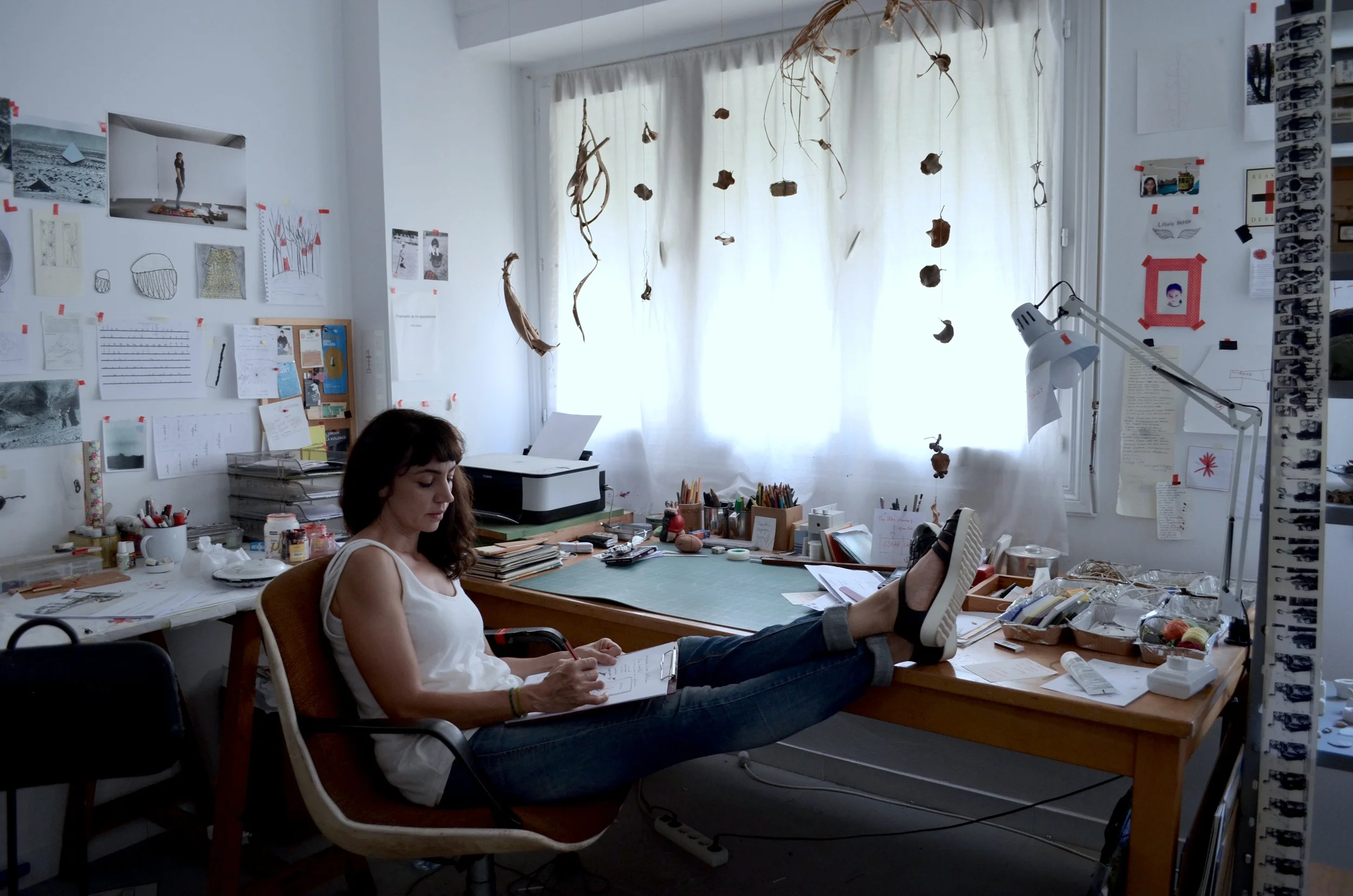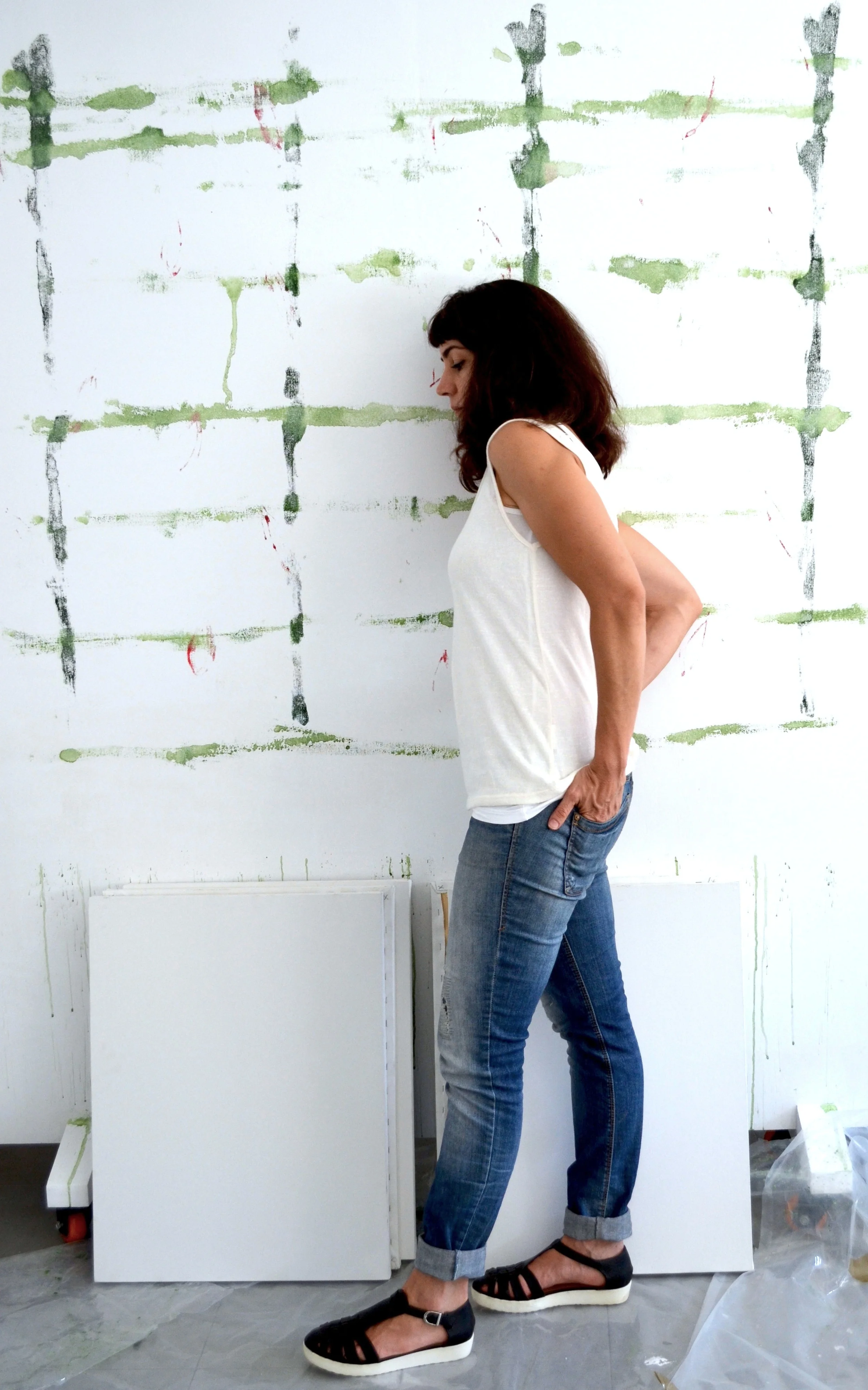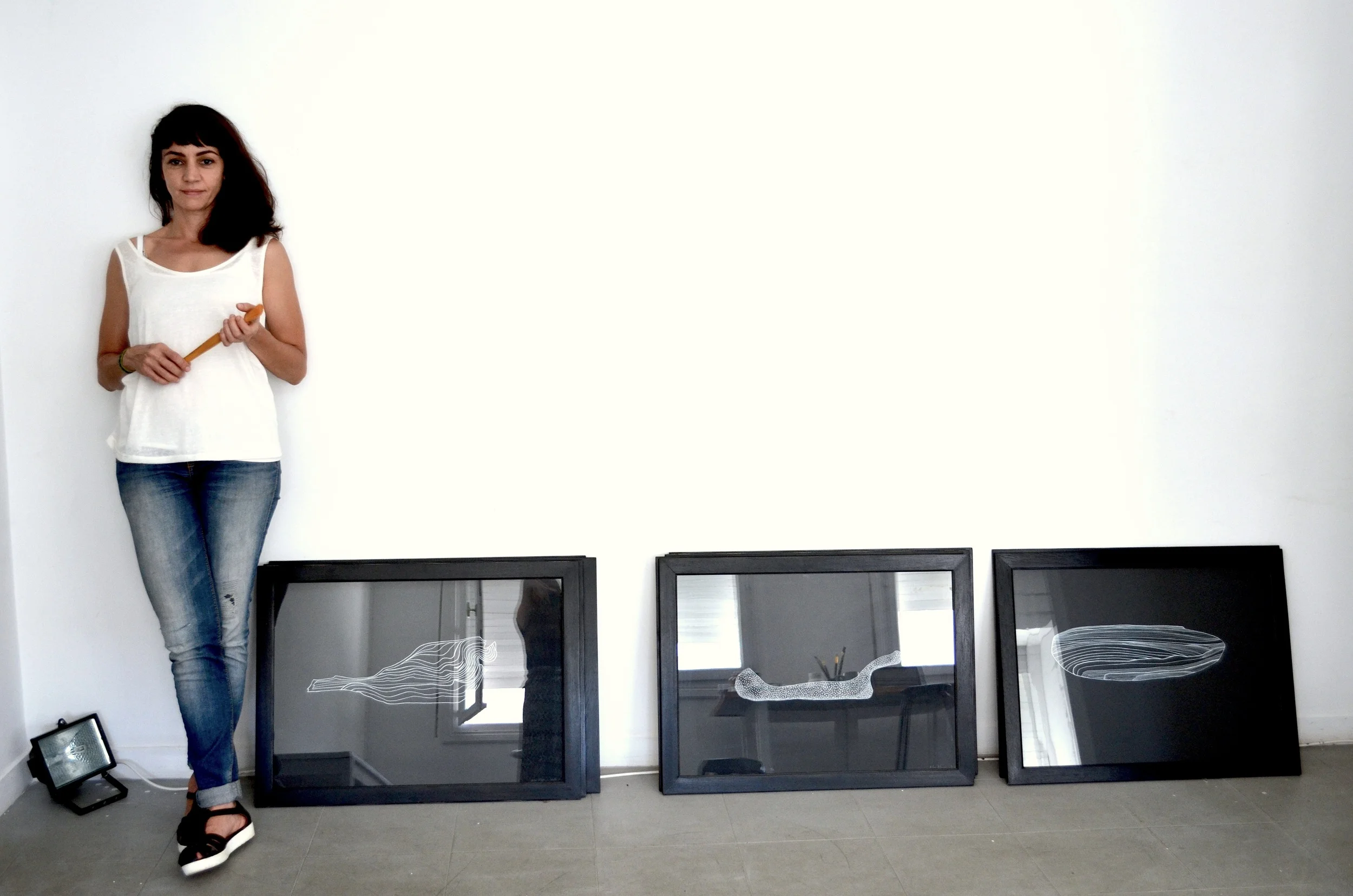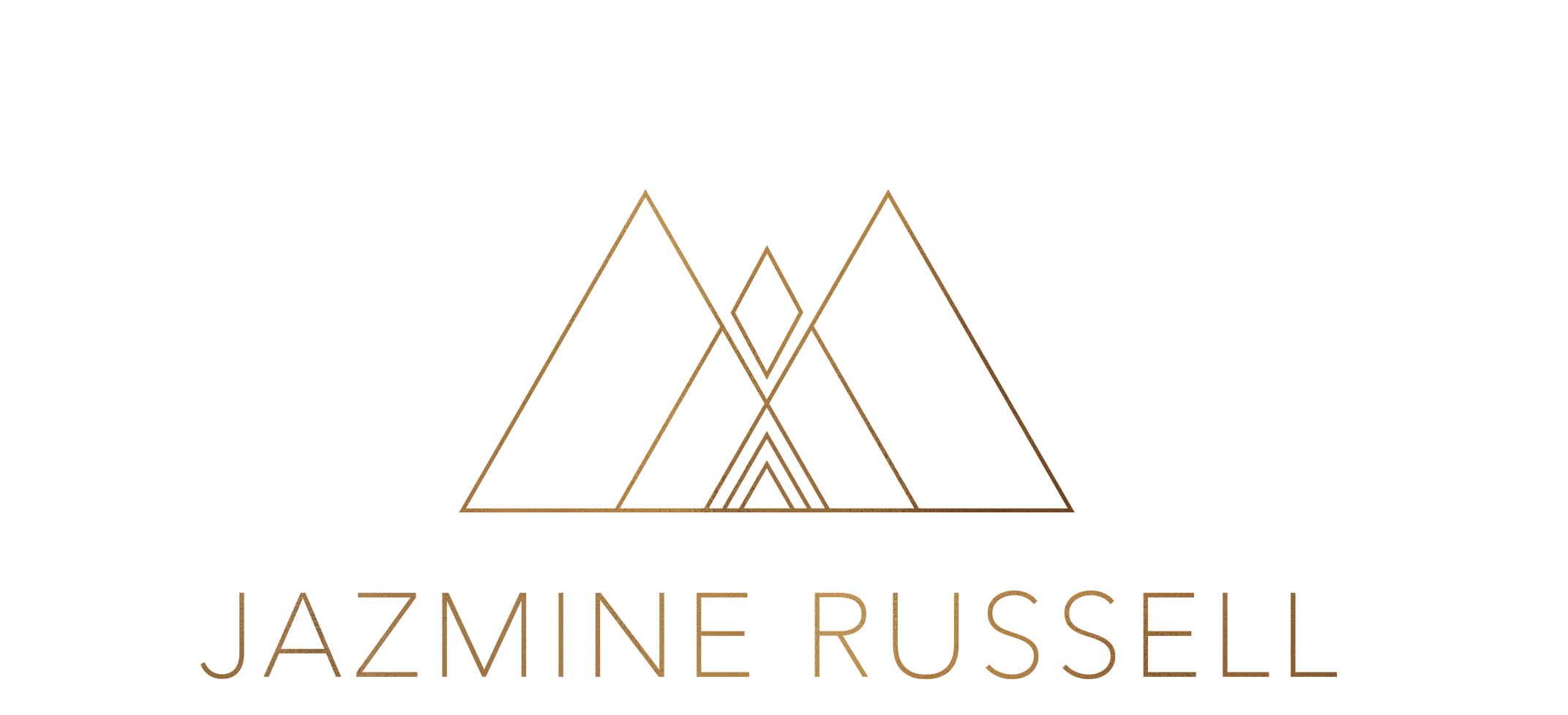Truth as Diversity - Reality as Transformation
Rita was born in 1972 in Rabat. She lives and works in Casablanca. Her work deals with the life experience of the human being and its relationship to the environment. One of her preoccupations is the relationship between man and nature through the symbol of the tree and the forest. She created the Tree of life in 2009 which became her archetypal tree, and the Forest of Life in 2012, miniatures forests around which she constructs stories with nature as a hero. She is also interested in social links, in the lack of love in modern societies and in the phenomenon of isolation.
Her paintings, installations, enhanced photographs or writings, brings out our humanity, our fears, our dreams. Rita’s work opens a window to the world from an exacerbated, poetic and non traditional point of view, bringing up the observation of ordinary life and the conscience of the impermanence of things. Her work has been presented in numerous solo exhibitions in the major Moroccan galleries This past ten years. She participated in several international group exhibitions. Her first artist book, Fragment de Vie Quotidienne (éd.Al Manar, 2013) knows a great success for its originality and diversity of its media, writing, photography and painting.
Rita is a graduate of Parsons School of Design, New York where she received a BFA in painting 1996 and is a major figure of the contemporary Moroccan art scene. In january 2013, Rita created the alternative art space and artist in residency program, The Ultra Laboratory based in Casablanca.
http://www.theultralaboratory.com











Excerpts From the Interview:
Jazmine: So tell me something about your view of reality. Something you believe to be fundamentally true about existence.
Rita: Something that should be?
Jazmine: Something you believe is true about existence.
Rita: Well what I believe is true is that there are many realities. That there are as many realities as there are people on earth. But I also believe that there is a universal reality, probably, which is maybe based on some human qualities that are common to all cultures.
Jazmine: Like what?
Rita: You know, like being good, being sincere, being generous, open to otherness. To me this is very important, but I don’t know if it’s reality. That’s the thing, you know?
Jazmine: So the universal reality is maybe more an ideal reality? Something you would like to be true?
Rita: Well, no that shouldn’t be my answer because this is not a universal reality, it is a universal desire rather than reality. But if I’m going to talk about a universal reality, I would talk about maybe death? Because every human being or every living thing knows the end. So that’s a big reality. There’s the reality that things change constantly, as you grow up as a child, you start knowing that. So I think that’s the reality of the world is to know that there is an end.
Jazmine: So there are fundamental aspects of existence like death and change, but what are some of the more subjective aspects of reality, the more individual aspects?
Rita: I think my reality is not yours and it’s not his and it’s not the woman’s who lives across the street, so human beings build their realities with what they’ve learned growing up and this is how they can call it their reality, so it’s extremely subjective. The reality for my children is to be born here, to live in this apartment, to have this type of life, but the reality for a kid who lives in the Bidonville, to him that’s his reality, so it’s whatever you open your eyes to when you are born, I guess.
…
Jazmine: What do you think is 'wrong', as you said, with the views that a lot of people in this culture hold?
Rita: Its just that they’re running after something false, you know? They’re running after money most of the time. Running after belongings, cars, houses, and things like that. To me it’s completely absurd. But it’s just because these people haven’t touched their inner selves. We are all the same, this isn’t a superpower, it’s just that some of them are too afraid to go within themselves. So they stay with superficial needs and try to fill them and this is how they think they’re happy.
Jazmine: What is the most important thing about the spiritual realm to you?
Rita: The spiritual? Well, to me, the spiritual part is the only way to keep your head on straight, you know? Not like go completely insane. Because, you know, life is difficult for everybody. Everybody has his own difficulties. But I guess the spiritual space gives you another dimension to think, to feel, to hope, and to me it’s very essential to know that things aren’t just what they seem to be. There is another dimension that is really around us and that is probably helping us or trying to teach us lessons. So I like to believe in that.
Jazmine: So if there’s a spiritual dimension and a more physical dimension, how do you think those two are related, if you think they are at all?
Rita: Well I think that being successful in life is being able to relate them, and that’s very difficult. For instance, if you take the case of a big spiritual guru in any culture - it can be Buddhism, it can be Sufism - these people, if they don’t know how to apply what they’ve learned in their daily life, into society, into relationships with their friends, their husband, their wives, then it doesn’t work, you know? There’s something that’s broken. So you have to be able to gain spirituality, but you have to be able to use it in your daily life, and that’s the most difficult part.
…
" I’m not going to follow a special path, it means that I like to talk with different people who have different beliefs or read different things, because at the end it all converges, it’s all the same. "
…
Jazmine: Well, because everybody has so many different ways of interpreting things and there’s so many different religions and beliefs about the world, do you ever get anxious by the idea of ambiguity, that there may not be one right answer?
Rita: Am I anxious about that? Well, it’s a very difficult question. I don’t think anybody has it “right” but I think some are closer to the rightness of it. And yes, I can be very anxious because you feel like the world is just crazy sometimes and you feel like there is this energy that you cannot control. And all of these lives and people and you cannot control them, so you can only control yourself. And maybe it’s your very tight family, and its not even the world because you can’t control anybody. On one hand it can be very frightening, yes, to know that the world is going crazy, but on the other hand I have this deep utopia belief that the world is going through this crazy cycle like a needed transformation path before becoming a better world. It is also a matter of time and space. When you think that hundred years seem long to you whereas it is a tiny microscopic laps of time in the universe, that brings you the vision of so many different realities to come over and over.
…
Jazmine: Does it make you anxious to think you may never find the right answer?
Rita: It doesn’t make me anxious because I know I will never find the right answer, anyways. I just know I may be more mature with time to accept that there is no right answer, you know? Because we have a tendency to look for the right answer when we are young and we believe that this is black and this is white and that’s it. And then growing up you start realizing that you have so many colors between black and white and so you just have to start accepting diversity and otherness as a richness. More and more acceptance is what will make my anxiety go down, with time. I hope.
Jazmine: You don’t think you’ve gotten there yet?
Rita: No I don’t think so but I am trying to!
…
Jazmine: How do you feel about freedom in life? The idea that there are so many possibilities to choose from.
Rita: That’s funny because I was thinking about that the other day. Well, I think it’s very exciting but on the other hand, how free are you? I mean, can you really do anything you want, go anywhere we want? No, I guess not. You can’t. So I think depending on your life picture, whether you have children or not, responsibilities or not…first of all your freedom can change because you cannot do as much as somebody else who is completely free from obligations. But…well freedom is a very big topic (laughter) Basically, I don’t think we’re completely free, no. I don’t think human beings are completely free. But of course, I can decide now to work or to go see a friend, that’s freedom as well. But freedom can be also kind of scary. To me freedom equals choices. That’s what it is. Choices at every moment of your day, of your life. But that’s what detriments your freedom path.
Jazmine: So the choices that you’ve made before might limit your choices in the future?
Rita: Yes
Jazmine: Is there any particular area that you feel more limited in?
Rita: Am I more limited… ? I would probably speak about freedom of speech and also freedom to approach certain topics through art in general. But you know this a false problem because there are always devious ways of saying things, so instead of being frustrated and doing nothing let’s first convey love as much as we can and the notion of freedom will be so much natural. It is all a matter of how you say things to the other.
Jazmine: That’s true.
Rita: If seeking freedom is to think, “I would rather be in that situation than that one and then I would be free” well as we say “the grass is always greener on the other side!”
Jazmine: Everybody wants what they can’t have.
Rita: Exactly
…
Rita: So I guess it’s just events in your life that shape your art and also because maybe I turned 40 and 40 to me is, you know, like a turning point, so I had to make a big point and know who I am and where I’m going and why.
Jazmine: Do you think you’ve figured out little pieces so far?
Rita: I think I did but it’s the hardest part of my life. I did, but it was really, really difficult to go through this transformation, you know? It’s like you change skin, but in a good way I guess. Because staying the same and then waking up, you know, 20 years from now not knowing what you’re doing is kind of sad to me.
…
“I’m not saying I know what I’m doing, I’m just saying I’m doing what keeps me balanced and keeps me going, you know?”
…
Jazmine: How do you think that your culture and where you grew up has shaped your experiences and your beliefs about the world?
Rita: For me, what really shaped my beliefs was the family I grew up in, rather than the city itself. It does become part of you, to be part of a culture, of course. In terms of rituals and religious customs and things like that. But it really depends on your family because you have so many ways of growing up here. So the impact for me is first from my parents than from the environment itself.
Jazmine: Would you mind sharing something about your parents that may have had an impact on who you are?
Rita: Well, I guess, the family I grew up in was very open-minded. So to me that was, on the one hand, a great gift, but on the other hand, it gives you choices, and that gives you have a hard time knowing who do you belong to- where you belong to, you know? But I guess they’ve given me a lot of openness and then in terms of my art I’ve been also pushed a lot and they believed in my art. And to me that’s a very big gift, to have parents who tell you that you can become a successful artist and that you can study art, which, you know, sometimes they want you to study medicine or whatever. Being in between two cultures can make you feel completely alienated. I grew up with a French- Moroccan education, I studied at a French school here. Only a minority of people go to French schools. So if you happen to make it, you go directly to either French school or Spanish school because of the better educational level. So it’s really growing up bi-cultural. And that can be really alienating but very rich.
Jazmine: So you never really knew where you belonged?
Rita: Yeah, kind of
Jazmine: Is that expressed in your art at all?
Rita: In fact, my art has been based on a universal search. So it can speak to anybody. I have art based on issues towards the environment, towards nature, towards randomness, spirituality, identity all of that. But only now I’m starting to talk about my culture and my origins. I’m working on a performance where I invited my cousin who is a filmmaker to participate. I’ve had this project for four years and it’s completely linked to my grandmother and to my own culture. So this is, for me, the first time I’m expressing so directly something of my Arab culture. Which is cool.
…
"We are all trying to make it in a very difficult world and everybody is struggling with his own self. And you realize that no one is completely satisfied or happy and you realize also that people have dark sides and so when somebody seems not nice or doesn’t answer or seems angry, its because he has some issues. But to me, life is really like this huge scene, like a theater, you know? And everybody is trying to find a corner in this theater. And well, here it’s art that brings people together so it’s a very important element to mention because it does bring people from the outside because they’re curious, it does bring us together because we speak the same language, so to me art is a great way to wash up your demons. "
…

